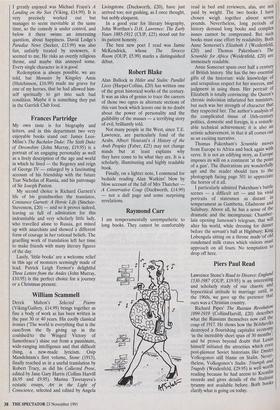Raymond Carr
I am temperamentally unsympathetic to long books. They cannot be comfortably
read in bed and reviewers, alas, are not paid by weight. The two books I have chosen weigh together almost seven pounds. Nevertheless, long periods of history demand long books and complex issues cannot be compressed. But such books must ease effort by readability. Both Anne Somerset's Elizabeth I (Weidenfeld, £20) and Thomas Pakenham's The Scramble for Africa (Weidenfeld, £20) are immensely readable.
Anne Somerset spans over half a century of British history. She has the two essential gifts of the historian: wide knowledge of and scrupulous respect for her sources, and judgment in using them. Her portrait of Elizabeth is totally convincing: the Queen's chronic indecision infuriated her ministers, but such was her strength of character that they respected her. The author's analysis of the complicated tissue of 16th-centurY politics, domestic and foreign, is a remark- able technical achievement; it is also an artistic achievement, in that it all comes out as an exciting narrative. Thomas Pakenham's Scramble moves from Europe to Africa and back again with verve. It is not an edifying story, as Europe imposes its will on a continent 'at the point of a gun'. The illustrations are wonderfullY apt and the reader should turn to the photograph facing page 501 to appreciate the horror of it all.
I particularly admired Pakenham's battle scenes — a difficult art — and his vivid portraits of statesmen as distant in temperament as Gambetta, Gladstone and Salisbury. Above all, he has a sense of the dramatic and the incongruous: Chamber- lain opening Jameson's telegram, that will alter his world, while dressing for dinner before the servant's ball at Highbury; King Lobengula sitting on a throne made-of old condensed milk crates which visitors must approach on all fours. No temptation to drop off here.








































































 Previous page
Previous page